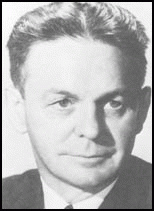William Cornelius Sullivan was the chief architect of the Federal Bureau of Investigation's clandestine and illegal Operation COINTELPRO during the tenure of director J. Edgar Hoover. Sullivan was also a master at media manipulation shaping the news to the benefit of the Bureau.
Operation COINTELPRO was a massive, secret, nation-wide operation aimed at hundreds of domestic political targets. Ordered by Hoover to "disrupt" the Black Panther Party and other groups by any means necessary, FBI agents used a wide variety of illegal and improper tactics. One of the time-tested methods of eliminating the leadership of local Panther chapters was obtaining false convictions by use of withheld evidence, planted evidence, and false testimony.
Sullivan, an assistant director, was the highest-ranking FBI official to admit public knowledge of the 'Omaha Two' case. Black Panthers Ed Poindexter and Mondo we Langa (formerly David Rice) headed the Omaha, Nebraska chapter and were COINTELPRO targets. The August 17, 1970 bombing murder of policeman Larry Minard was followed by the prosecution of the two Omaha activists for his death and led to their conviction following a controversial 1971 trial that was marred by withheld evidence and conflicting police testimony.
In October 1970 at a conference of United Press International, Sullivan falsely denied the existence of a "conspiracy" against the Black Panthers and tried to squelch sympathy for the Panthers. Sullivan told the assembled reporters, "Panther cries of repression at the hands of a government 'conspiracy' receive the sympathy not only of adherents to totalitarian ideologies, but also of those willing to close their eyes to even to the violent nature of hoodlum 'revolutionary' acts."
Sullivan also spoke of his knowledge of Minard's death. "On August 12, 1970 [sic] an Omaha, Nebraska police officer was literally blasted to death by an explosive device placed in a suitcase in an abandoned residence. The officer had been summoned by an anonymous telephone complaint that a woman was being beated [sic] there. An individual with Panther associations has been charged with this crime."
What Sullivan didn't tell assembled reporters was that Hoover had already ordered critical evidence withheld from the 'Omaha Two' with a directive to FBI Crime Laboratory director Ivan Willard Conrad. The 911 tape recording of the killer's voice had been sent to FBI headquarters for vocal analysis but Hoover ordered no lab report be issued after the testing.
Sullivan was on a special distribution list at the COINTELPRO directorate in FBI headquarters where he received various secret memos from the Omaha FBI office updating him on the status of the investigation and the ongoing deception about the recording of the killer's voice.
The jury that convicted Ed Poindexter and Mondo we Langa never got to hear the tape recording or know that Hoover had personally ordered evidence about the killer's identity withheld.
The Omaha World-Herald's coverage of the case was apparently manipulated to aid the FBI plot to keep quiet about the 911 tape. The newspaper initially reported on the tape's journey to Washington quoting acting-Chief of Police Walter J. Devere that the tape would be a good investigative tool. However, the Omaha newspaper never followed up their lead story on the testing of the fatal recording and subsequent articles about the case dropped the subject.
Sullivan was fired by Hoover several months after the Omaha trial ended for leaking to the Justice Department information about unauthorized FBI wiretaps on Henry Kissinger. Sullivan retaliated by writing a book, The Bureau: My Thirty Years in Hoover's FBI. The autobiographical account is far from a tell-all and Sullivan's self-aggrandizement agenda is apparent. However, Sullivan does make some remarkable admissions.
Although Sullivan is virtually silent about COINTELPRO and does not mention the 'Omaha Two' case at all, he boasts about his prowess working the news media to manipulate stories. "Because of this network of field offices, and thanks to scores of contacts made and maintained by the special agents in charge, Hoover was able to place 'news' stories--invented and written in the bureau, really nothing more than press releases, puff pieces for the FBI--in newspapers all over the country. Our strength was in the small dailies and weeklies, with hundreds of these papers behind him."
"Of course, scores of Washington-based reporters printed stories we gave them too, and they usually printed them under their own bylines. Some of them lived off us. It was an easy way to make a living. They were our press prostitutes."
"We also planted stories critical of some of Hoover's favorites targets, the CIA for instance. And of course we placed stories about Hoover's congressional critics. A negative story which appears in a newspaper published in a congressman's home district hurts him more than any article in the Washington Post."
"Letters went by the thousands to the Jaycees, the newspaper editors, the movers and shakers so carefully cultivated as FBI contacts by our agents out in the field. These field agents were also responsible for reading any article or letter to the editor that mentioned the FBI or Hoover. Any favorable mention of either in any newspaper in America meant a personal letter of thanks from Hoover."
"This public relations operation of Hoover's, this massive attempt to control public opinion continues to this day, and is at the very heart of what is wrong with the bureau. Unless it is exposed, until every editor of every little weekly newspaper who ever printed an FBI press handout realizes how he has been used, the FBI will continue to do business in the same old way."
(Note: You can view every article as one long page if you sign up as an Advocate Member, or higher).





